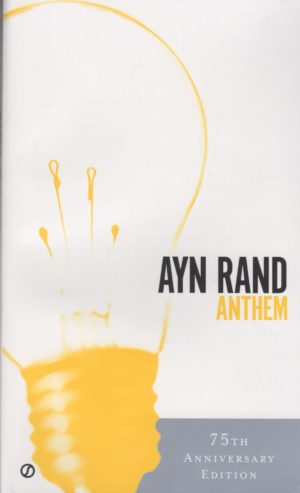
Anthem by Ayn Rand (1995. Signet. ISBN 978-0-451-19113-7)
And we sighed, as if a burden had been taken from us, for we had been thinking without reason of the Palace of Mating. And we thought that we would not let the Golden One be sent to the Palace. How to prevent it, how to bar the will of the Councils, we knew not, but we knew suddenly that we would. Only we do not know why such thought came to us, for these ugly matters bear no relation to us and the Golden One. What relation can they bear?
That’s the most complex language and literary structure this novella ever achieves. Throw in the fact that the primary premise, one man, the “we” (otherwise known as Equality 7-2521) in the above sequence, escapes a post-apocalyptic world into a vast and empty forest because he is being hunted for his re-discovery of electricity (an improvement of modernity that is forbidden, secret, and seemingly lost to the mass of humanity) is so flawed in detail and plausibility so as to remind me of a seventh grader’s attempt at speculative fiction. To be fair, Rand’s native language was Russian so perhaps her depth of English comprehension when she began this work in the early 1920s wasn’t as expansive as when she penned Atlas Shrugged some three decades later. But for this weakly penned work to ever have seen the light of day (pun intended) is a remarkable testament to the unpredictability of editorial taste. So many questions, questions that any self-respecting science fiction author would attempt to cover in a story’s narrative, remain unanswered that it’s extremely difficult to take Rand seriously as an author or philosopher. How does Equality 7-2521 generate the electricity that eventually lights the glass box that he carries about? How does he move from his discovery of a crude battery (metal and liquid in a jar that creates current) to a power source that is portable and seemingly inexhaustible? How does he fashion a bow and arrow sufficient to down birds for meals when he has no tools? How is it that he and the Golden One (who inexplicably finds him in the great wooded wilderness with no outdoor or tracking skills) surround themselves with a ring of fire (how many matches do they have, anyway?) to stave off wild beasts and yet they do not cough or inhale the smoke of the fire surrounding their resting place? These are but a few points to consider, but points that even a seventh grade novelist would attempt to tackle. Rand apparently saw no need to make her tale of individuality believable, relying instead upon a steady revelation of the importance of “I”, the singular one, to carry the tale. But she doesn’t pull it off. The story is limpid, dull, and much like her doctrine of objectivism (the premise that each man must be left unfettered by constraints of government, religion, or culture to attain his natural position in the order of the world), fatally flawed. I enjoyed, to a degree, Rand’s storytelling, if not her pontification, in Atlas Shrugged and The Fountainhead. I read both to learn more about the philosophical underpinnings of the political thinking of modern day objectivists such as Rand Paul and Paul Ryan. If you too are interested in alternative ways of thinking about mankind, those are two novels that I’d recommend. I would not recommend Anthem.
One final note. The addition of Rand’s manuscript corrections to the British version of the book adds absolutely nothing to one’s understanding of the story or Rand’s point of view.
1 star out of 5. If you must read this tripe, save a tree and buy it as an eBook.
Peace.
Mark


